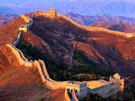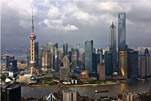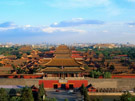| Work Together to Shape the Future |
| 2011-11-13 23:45 |
|
Speech by H.E. Hu Jintao Hawaii, 12 November 2011 Mr. Craig Mundie, Chairman of the APEC 2011 USA Host Committee, I am delighted to join you, leaders of the Asia-Pacific business community, in the beautiful state of Hawaii and exchange views with you under the theme of "The Future. Redefined". The current world economic situation deserves our high attention. Some major economies are experiencing economic slowdown, and some countries are facing acute sovereign debt problems. Volatility in the international financial markets persists. Rising inflationary pressure confronts emerging markets. Protectionism in various forms is on the notable increase. Global economic recovery is fraught with greater instability and uncertainty. New changes are underway in global economic governance, but such changes have not kept up with the evolution of the global economic landscape. Fresh progress has been made in adjusting the world economic structure, but more needs to be done to meet the urgent need to shift the economic growth model. New breakthroughs have been achieved in scientific and technological innovation, but they have not been turned into new and powerful growth drivers. The theme of this summit - "The Future. Redefined", is particularly relevant. It will help us gain a deep understanding of new regional and global developments, identify the trend of the global economy and regional cooperation in the time to come and seek solutions to issues of concern to the business community. Under the current circumstances, we must be firmly committed to maintaining growth and promoting stability, with a special emphasis on ensuring strong growth in order to add momentum to the economic development in the Asia Pacific and beyond. With this in mind, I wish to share with you the following observations. First, we need to improve the mechanism for global economic governance and build an equal and more balanced global partnership for development. The emerging markets and developing countries are carrying greater weight in the global economy and playing a bigger role in global economic governance. The new mechanism for global economic governance should reflect the changes in the world economic landscape. It should observe the principle of mutual respect and collective decision-making and increase the representation and voice of emerging markets and developing countries. It is important to promote better understanding and coordination between developed and developing countries. Developed countries should fulfill their responsibilities and obligations in international economic governance and take more concrete actions on the issue of development. Emerging markets and developing countries should shoulder international responsibilities as their capability permits and in keeping with their particular national conditions and stages of development. All of us should make concerted efforts to achieve balanced, inclusive, sustainable, innovative and secure growth of the world economy. Second, we need to implement the APEC Leaders' Growth Strategy and achieve green and innovative growth. The strategy adopted last year in Yokohama, with green and innovative growth as core elements, charts the course for the growth of the Asia-Pacific economy in the years ahead. We should actively promote the idea of green development and respect the choice independently made by APEC members to pursue green growth on the basis of their resource endowment, stage of development and capacity. We should enhance dissemination of and cooperation on environmental technology, help developing APEC members build environmental industries, avoid new green trade barriers and strive for simultaneous progress in environmental protection, trade and development. We need to step up international cooperation on technological innovation and help APEC members build innovation capacity, pursue technological innovation and industrial upgrading, and promote industrial application of scientific and technological achievements. We should make innovation the main driver of growth and let the people of all countries enjoy greater benefits from innovation. Third, we should uphold the multilateral trading regime and deepen regional economic integration. The multilateral trading regime is charged with the heavy responsibility of coordinating national trade policies, balancing international trade relations, reducing trade frictions and promoting world economic growth, and it has played an important role in countering the international financial crisis and opposing protectionism. We should fulfill our commitments, firmly oppose and jointly resist protectionism of all forms, and work to make the multilateral trading regime a balanced and inclusive one that benefits all. We should advance the Doha Round negotiations and endeavor to reach an "early harvest" agreement within this year on giving tariff-free, quota-free treatment to products from the least developed countries. China has announced its decision to give zero-tariff treatment to 97% of the tariff items of exports to China from the least developed countries having diplomatic ties with China. We should vigorously promote regional and sub-regional economic cooperation and the establishment of free trade areas. We should adopt multiple means and work at different levels and in different areas to achieve better and faster progress in the regional economic integration process. China supports steady efforts to build a Free Trade Area of the Asia Pacific on the basis of the East Asia Free Trade Area, the Comprehensive Economic Partnership for East Asia and the Trans-Pacific Strategic Economic Partnership Agreement, with the goal of achieving economic integration in the Asia-Pacific region. Fourth, we should strengthen public-private partnership and jointly promote world economic growth and business cooperation.The business community is the main force driving economic growth in the Asia-Pacific region and the growth in international trade. It plays a major role in powering the recovery here in the Asia Pacific and promoting global economic growth. Government departments should therefore better appreciate the role of the business community in promoting growth, listen to its views and suggestions, and encourage its active participation in economic development and regional cooperation. We hope that the business community will continue to be strategic and forward-looking in thinking and put forward suggestions on major issues such as trade and investment liberalization and facilitation, regional economic integration and the long-term development of APEC. We also hope that it will make good use of APEC mechanisms and platforms at various levels and in different areas to share information, explore opportunities and deepen cooperation to achieve win-win progress. Ladies and Gentlemen, Thanks to more than 30 years of reform and opening-up, China's economy has grown steadily. Its GDP has significantly increased. And it is opening much wider to the world. On the other hand, unbalanced, uncoordinated and unsustainable development poses a major challenge to China. The constraints of resources and the environment on the economy have become more acute. China's capacity for innovation is not strong. The industrial structure is not balanced. Development between urban and rural areas and among different regions lacks coordination, and there are many institutional hurdles hindering economic and social development. At the beginning of this year, China adopted the Outline of the 12th Five-Year Plan for Economic and Social Development which lays out the blueprint for China's future development. Under the plan, we will continue to pursue development in a scientific way and give priority to speeding up the shift of growth model. We will deepen reform and opening-up, ensure and improve people's livelihood, and promote sustained, steady and fairly fast economic growth and social harmony and stability. To achieve these goals, we will make the following efforts: First, deepen economic structural reform and improve business and investment environment. Guided by the principle of improving government functions, establishing clearly defined responsibilities among government departments, improving government structure and raising efficiency, China will speed up the building of a service-oriented and law-based government, deepen reform of the administrative review and approval system, reduce government intervention in microeconomic activities, improve mechanism for checks and oversight, and ensure that government services are provided in a standardized, orderly, efficient, convenient, open and transparent way. We will continue to improve the investment environment, public services and management as well as the market system, and provide a fair, stable and transparent environment for both domestic and foreign investors. Second, grow a green economy and promote the conservation culture. China is committed to green and low-carbon development. It pursues energy conservation and emissions reduction on a priority basis to better achieve sustainable development, meet the climate challenge and promote the conservation culture. During the 12th Five-Year Plan period, China's environmental industry will continue to grow rapidly, and its total output is expected to exceed RMB2 trillion by 2015. From 2011 through 2015, China's investment in the environmental sector will reach RMB3.1 trillion, doubling that of the previous five years. China's green industry, including energy conservation and environmental protection sectors, is a key area for foreign investment. The strong green demand and China's sound investment environment will provide a vast market and great investment opportunities to businesses in all countries, those in our region in particular. Third, step up protection of intellectual property rights and make China a country driven by innovation. China takes protecting intellectual property rights seriously. We have pursued a national strategy for protecting intellectual property rights, established and improved the legal system for IPR protection and stepped up enforcement and judicial protection. On the basis of protecting intellectual property rights, and with a focus on making home-based innovation and breakthrough in key areas, China will vigorously boost scientific and technological innovation and redouble efforts to set up a system of technological innovation with enterprises being the major players. China will work hard to turn itself into an innovation-driven country, bring in high-caliber and innovation-minded professionals from overseas, and achieve the transition from "made in China" to "created by China". Fourth, open wider to the outside world and take an active part in global economic governance and regional cooperation. China will raise its opening-up program to a higher level by expanding its scale and broadening its scope. We will more actively pursue the opening-up strategy, promote development, reform and innovation through opening-up and continue to honor our commitments and due obligations. China will give equal importance to import and export and focus more on increasing import while maintaining a stable level of export. It will place equal emphasis on in-bound investment and out-bound investment and focus more on encouraging Chinese business investment overseas while stabilizing and increasing foreign investment in China. China will work to reform the international economic system and promote a more just and equitable international economic order. We will intensify macroeconomic policy coordination with other major economies and play a bigger role in international economic and financial organizations. China will move faster in pursuing the strategy of establishing free trade areas, strengthen business ties with major trading partners and deepen practical cooperation with other emerging markets and developing countries. Ladies and Gentlemen, China's development constitutes an important force driving economic growth in the Asia-Pacific region and the world. China is in a process of industrialization, urbanization, promoting IT application, developing the market economy and pursuing international exchanges. And it is transforming the economic structure at a faster pace. China has huge market potential and sufficient supply of capital. Its scientific and technological capabilities, educational standards and infrastructural facilities have all been improving, and the social security system has been gradually enhanced in the country. All these will provide good opportunities for the Asia-Pacific business community to make investment and expand its presence in China. We hope that the Asia Pacific business community will actively participate in China's reform, opening-up and modernization process and share in the opportunities and achievements of China's economic development. We in China will work with you hand in hand and with all sincerity to create a better future for all of us in the Asia-Pacific region. Thank you. |
|










